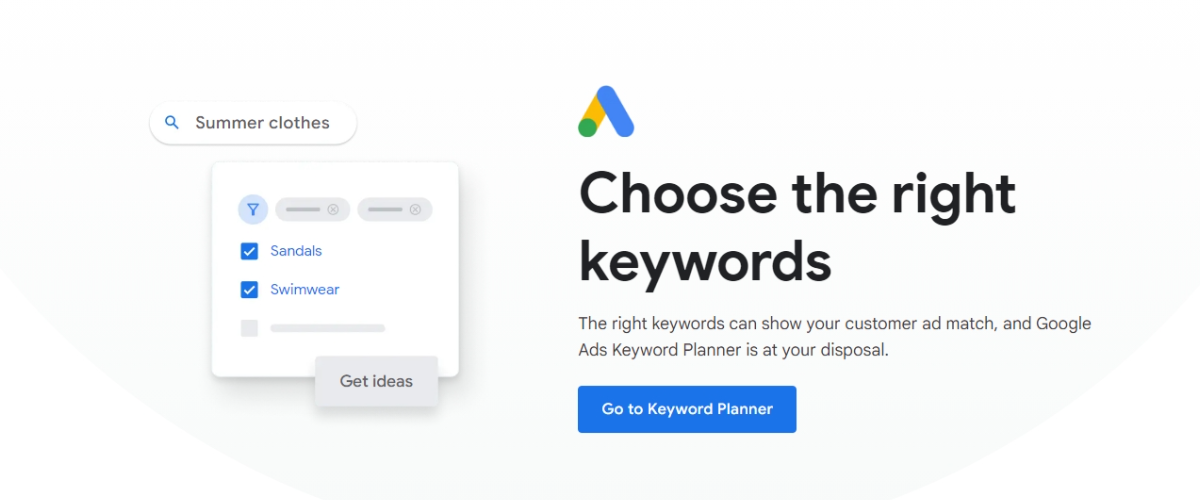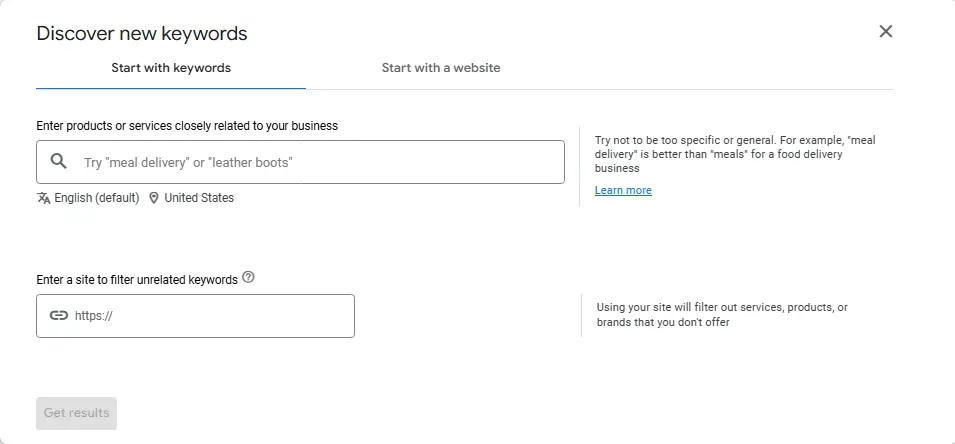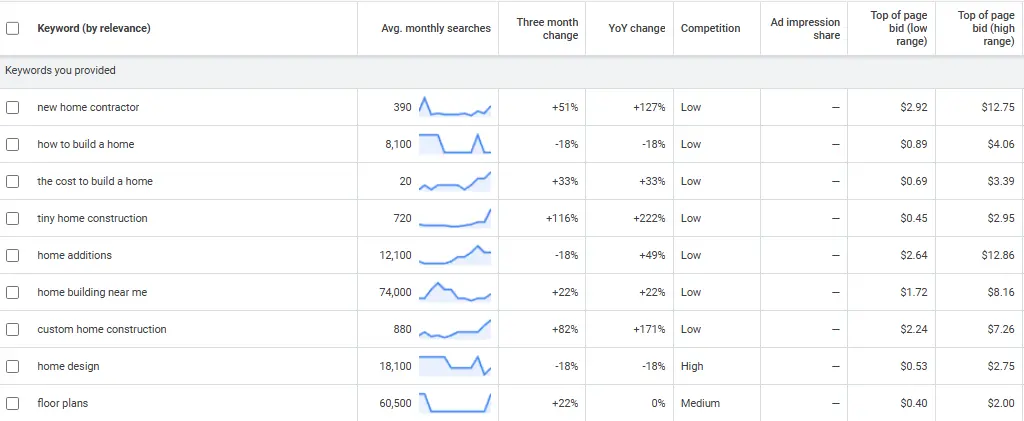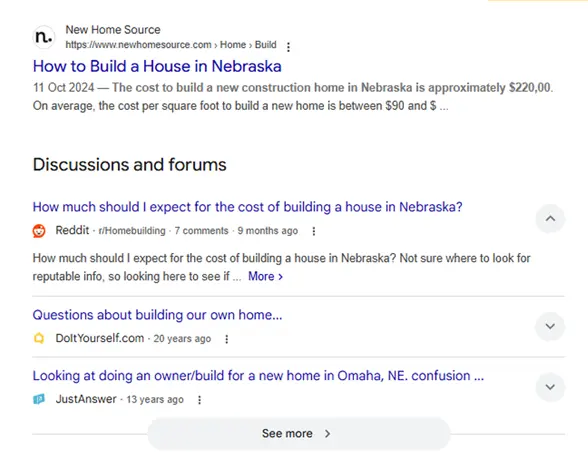How to do Keyword Research For Home Builders In 2026
Have you ever wondered what type of content and what keywords will increase your website traffic and rankings?
I want to show you what are the most Googled words or phrases in 2026 that relate to the home building industry…
But also how to research these ‘keywords’ for yourself.
Let’s begin!
Keywords And Keyword Research
- Keywords are the main words or phrases that people type on Google to look for a business or service. Someone interested in building a home will type 'home building near me'.
- Keyword Research is the process that uncovers the best keyword opportunities. It involves various aspects that experts keep in mind when determining what keywords are worth going for.
There are several tools that allow you to research the best keywords to target for your home-building website.
However, considering you don’t have access to paid keyword research tools like Ahrefs or Semrush (and I doubt you want to spend hundreds of dollars to buy them), I’ll only show you how to use a free tools, which is also one of the best.
Don’t worry, though. The ‘free’ tool is one from Google itself. Google Keyword Planner pulls all the data about keywords right from Google, so we know for certain that’s the most accurate data we could get.
Keyword Research With Google Keyword Planner
Google Keyword Planner is a great tool within the Google Ads platform.
So yes, you’ll need to have a Google Ads account to access the tool and get data about keywords.
And creating a Google Ads account is easy and fast. Check out this video and create one for your home building business. You don’t even need to start running the ad, just create the account.
1. Accessing the Google Keyword planner
- Go to your Google Ads account
- On the left side dashboard, go to Tools
- In the menu that opens, go to Planning
- In the Planning menu, choose Keyword Planner
- In the Keyword Planner, you'll see 'Discover new keywords', 'Get search volume and forecasts', and 'Organize keywords into ad groups'. Choose 'Discover new keywords'.
For now, the other two options within the Keyword Planner won’t help you as much. We’ll talk about them in another post.
Now, you’re inside the Google Keyword Planner and you’re ready to start doing your keyword research.
2. Discover new keywords
You’ll have two options here.
You can Start with keywords or…
Start with a website.
Let me tell you how these work.
Start with keywords
Start with a website
This option works great to audit your own website and see what keywords you’re ranking for. It’s also great to inspect your competitors’ website and see their keywords, so you can also use some of them.
3. Start With Keywords
In the ‘Start With Keywords’ tab, under ‘Enter products or services closely related to your business’, you’ll do exactly that.
You’re a home builder, so let’s see what words or phrases would make most sense.
Some examples would be:
- new home contractor
- how to build a home
- the cost to build a home
- top 5 home builders in my area
- tiny home construction
- home additions construction
- home building near me
- custom home construction
- home design
- floor plans
- best home building materials
- latest home building trends
Make sure you select the area you want to get results for, and the language. It’s good practice to leave ‘English’ as the main language and ‘United States’ as the location. Sometimes, you can also use your state as the main location for more localized search terms.
If you also have a website or a competitor’s website that’s also a home builder, add the link under ‘Enter a site to filter unrelated keywords’.
This will analyze the type of service you offer and will filter all the irrelevant keywords from your keyword research.
Press ‘Get Results’ to see the keywords it pulled.
4. Reading The Data
If you’re an analytical person and you love making data-driven decisions, this is where the fun begins.
The tool just returned a bunch of numbers in a huge table, but how do you read them?
Let’s see…
- Keyword: the keywords you typed in the previous window.
- Avg. monthly searches: the average number of users searching for that specific word.
- Three month change: how the avg. monthly searches changed in the past 3 months.
- YoY change: how the avg. monthly searches changed in the last year.
- Competition: how difficult is to rank for that word.
- Ad impression share: shows how many impressions a keyword gets on Google Ads.
- Top of page bid (low and high): shows how much are people paying to advertise for that keyword.
The first table you’ll see are the results for the keywords you provided in the previous window, and the table that’s under it will be with ‘Keyword ideas’, which are other keywords of phrases relevant to the words you added initially.
5. Making A Decision
Making a decision based on the research you did is probably the toughest.
This is because you could invest a lot of time and effort into a keyword that seems promising, yet you’re risking the market to change or to deal with a lot of competition.
Based on the image above, we can draw a few conclusions:
- tiny home construction: the number of searches is not huge, but we're seeing a 116% increase in the last 3 months, and 222% increase since the last year. This is definitely a keyword worth keeping an eye on.
- home building near me: a lot of people are searching for this. There's also an increase in searches, and the competition for this keyword is low, so there's not a lot of home builders who focus on this keyword.
- home design: although it has a good number of searches, the competition for this word is high, meaning a lot of websites are already ranking for this keyword. You'll have a hard time ranking for it as well.
As a rule of thumb, always look for the keywords or phrases with a high average monthly searches and low competition. If you’re in doubt, you can also Google the keyword and see what other websites rank for that word.
Bonus: What Else To Keep In Mind During Your Keyword Research
If you want the keyword research for your home building business to be on point, there are some other things you should be looking at as well.
I’ll give you 3 pointers that we here at Contracting Empire find the most useful.
Keyword intent
The keyword intent is the intent behind searching for that particular phrase or word.
For example, users that search for ‘building a home’ have a different intent than users who search for ‘home building services near me’.
The first one is looking for information, the second one is actually looking to build a home.
As a matter of fact, Google understands this so better that it returns different results for each intent.
Before deciding on a keyword from the Google Keyword Planner, try Googling it and see the type of results it returns. You can also check our article on Winning Keyword Research For Contractors to see some other tips.
Localized keywords
A Google search for a keyword like ‘best home siding’ will most likely return results from well-established websites likes Good Housekeeping, ThisOldHouse, or The Spruce.
However, adding a location to that same keyword and turning it into ‘best home siding in California’ will return different, local results.
Adding that location will help you in multiple ways:
- It's easier to rank because you're eliminating that nation-wide competition.
- It's more valuable because the users who will click on your website are locals.
- And it's more helpful because you'll provide more relevant information based on where the user is searching from.
Trending keywords
You’re a home builder, so you can always focus on trends in the home building industry.
For example, if you would’ve written a post on your website about ‘smart home devices’ 10 years ago (when the smart home trend started), that post would have received thousands of clicks.
In other words, write content about the newest materials, finishes, and styles, even if there aren’t too many people looking for that keyword yet.
Want To Try A Simpler Keyword Research Tool?
If you don’t have time or the energy to create a Google Ads account and browse the Keyword Planner, we have a great alternative.
This is something built exclusively for contractors like yourself. Home builders, remodelers, landscapers, decking contractors are all using this as a much easier tool to research keywords.
We’ve built it ourselves with the same data from the Google Keyword Planner. It’s updated, easy to use, and highly accurate.
Use our keyword research tool below!
Wrapping up
So, this is how you do keyword research for your home building business.
Are there more levels to it?
Of course.
But it doesn’t make sense for you to waste hours on this, especially when you’re supposed to grow your business and make money.






